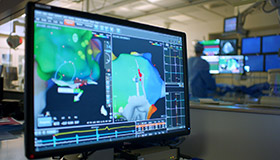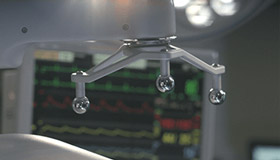Robotic Surgery Treats Rectal Cancer
Rectal cancer out of nowhere
Robert didn’t experience any symptoms before being diagnosed with stage 2 cancer of the rectum. In fact, most rectal cancer patients don’t experience symptoms. It isn’t until the disease has progressed when symptoms like these appear:
- A change in usual bowel activity
- Blood or mucus in the stool
- Abdominal pain
Robert led an active, healthy lifestyle, so the rectal cancer diagnosis was shocking — mainly since he didn’t have any of the risk factors for colorectal cancer, such as:
- A parent or sibling with the disease or with colon polyps
- Inflammatory bowel disease
- A hereditary disorder like Lynch syndrome that is linked to colon polyps
- Eating a low-fiber diet
- Smoking
Rather than be caught flat-footed, Robert chose to face colorectal cancer head-on. He underwent 10 weeks of chemotherapy and radiation to shrink the tumor before Dr. Recio performed minimally invasive surgery.
Robotic surgery reduces the risk of rectal cancer coming back
The rectum is made up of the last seven inches of the large intestine, which ends at the anus. The rectum’s proximity to other pelvic organs complicates rectal cancer surgery because the area is tight to work in. But Dr. Recio had the right tool for the job.
Dr. Recio performed Robert’s surgery using the da Vinci system. It allows surgeons to operate with the help of robotic arms through a few small incisions. The visual display on the da Vinci system magnifies the surgeons’ view of the area where they’re operating.
The robot makes a surgeon’s hand movements more precise and helps them maneuver specialized surgical instruments to operate in tight spaces. As a result, the da Vinci system may reduce the likelihood that cancer comes back since the surgeon can visualize more of the area and remove the tumor entirely.
With robotic surgery, patients enjoy:
- Less pain
- Shorter hospital stays
- Shorter recovery times
- A faster return to independence and lifestyle
- Minimal scarring
Robert’s surgery took only four hours, and he was in the hospital for just three days. The procedure removed the cancer — not only treating him but also getting him back into the gym and the active lifestyle he enjoyed.
Screening for colorectal cancer saves lives
Colorectal cancer is the third most common cancer and the second leading cause of cancer-related death in the United States*. Colonoscopies are recommended for men and women 50 and older. Black men and women should get a colonoscopy when they are 45 because they have a higher risk of developing colorectal cancer.
To schedule a screening, request an appointment with one of our experts or get more information about the Allegheny Health Network (AHN) Center for Digestive Health.
*https://www.cdc.gov/cancer/colorectal/statistics/index.html





